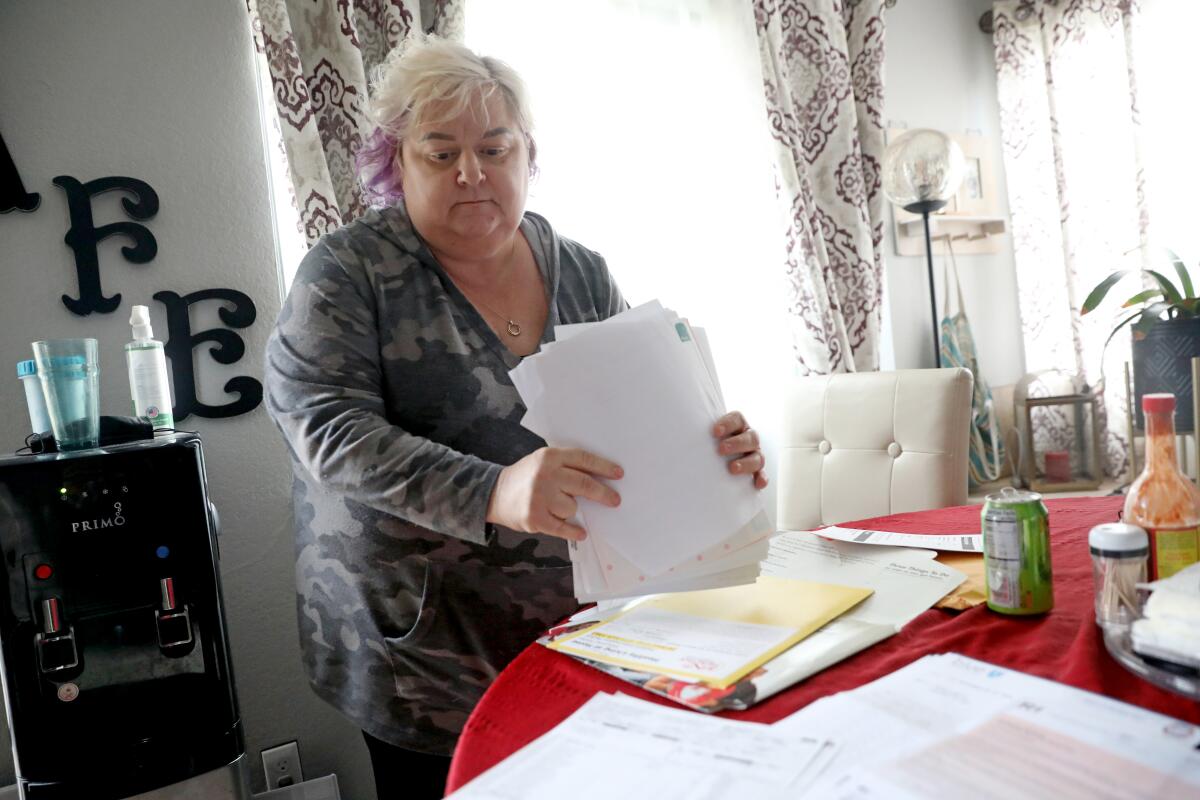Today’s Headlines: The $1.3-million COVID bill

- Share via
Some insurers have waived out-of-pocket costs for COVID-19 treatment. Others have not. Who’s going to pay for it?
TOP STORIES
The $1.3-Million COVID Bill
The most serious cases of COVID-19 don’t just attack a patient’s body. They can also damage the person’s bank account.
While it is difficult to know who will die from the virus and who will escape with a runny nose, it is just as hard for patients and hospitals to figure out their COVID-19 hit, what is covered and who will actually pay for the care.
Start your day right
Sign up for Essential California for the L.A. Times biggest news, features and recommendations in your inbox six days a week.
You may occasionally receive promotional content from the Los Angeles Times.
For Patricia Mason of Vacaville, Calif., being treated for the disease meant a bill of $1,339,181.94. She and her husband are on the hook for $42,184.20 of it. “I am lucky enough to be alive, so we take that into consideration,” Mason said. “But the reality is I don’t have [the money].”
Many insurance companies have waived all out-of-pocket costs for treatment, for some patients slashing a million-dollar-plus bill to nothing. But those waivers are voluntary, and many have already expired. For insurance plans with out-of-pocket maximums, the annual limit for a family was $16,300 in 2020 — and $17,100 this year.
And while medical bills for uninsured COVID-19 patients are covered by the federal government, the rules are complex, and hospitals must apply for the money.
More Top Coronavirus Headlines
— The coronavirus strain fueling a resurgence of COVID-19 in South Africa was not slowed by a vaccine that officials had been counting on to protect its front-line healthcare workers, prompting the government to shelve plans for an inoculation campaign that would have begun this month.
— The Biden administration has launched an unprecedented push to sequence tens of thousands of coronavirus samples from newly infected people in every state and territory of the U.S., and build a program to plumb that data for insights into where the pandemic is heading next.
— Los Angeles County’s daily coronavirus case numbers continued to decline, but health officials are concerned about the recent detection of more contagious variants and the potential for Super Bowl gatherings to trigger another surge.
For more, sign up for Coronavirus Today, a special edition of The Times’ Health and Science newsletter.
The Continuing Divide Over Trump
Congressional supporters of former President Trump are denouncing his Senate trial this week as unfair and unconstitutional, while Democrats contend that holding him accountable for provoking last month’s Capitol riot is a grave moral and political necessity.
Similar sentiments run through California and the nation as a whole. A new poll finds that more than 9 in 10 Democrats, but fewer than 2 in 10 Republicans, say they believe Trump was a major contributor to the insurrection.
Only 11% of California Republicans favor a Senate conviction of Trump, compared with 92% of the state’s Democrats, according to the poll released by UC Berkeley’s Institute of Governmental Studies. Republicans, however, have their own internal divisions over the former president, with a significant minority viewing him as at least partially culpable and rejecting him as a continuing leader for their party.
Such divided opinion is making life particularly difficult for Reps. Mike Garcia and David Valadao, two Republicans in California swing districts who took very different approaches in the aftermath of the election and the insurrection. And even at the municipal level, Republicans in California are having a hard time with voters after Trump.
More Politics
— Iran’s supreme leader urged the United States to lift all sanctions if it wanted Iran to live up to commitments under its nuclear deal with world powers, state TV reported, but President Biden says the U.S. won’t be making the first move.
— Biden said Trump’s “erratic behavior” should prevent him from receiving classified intelligence briefings, a courtesy that historically has been granted to past presidents.
— Biden gave a pep talk to a California woman who was laid off because of the COVID-19 pandemic, during a conversation the White House said is part of an effort to help him engage more consistently with regular Americans.
First and Seven
In Super Bowl LV, there were plenty of firsts. The first female referee to call the big game. The first poet at a pregame (see what Amanda Gorman had to say). Perhaps the first halftime show with an early-1980s goth flashback, thanks to the Weeknd. And, of course, the first time for a Super Bowl amid the pandemic.
But for Tom Brady, it was old hat, as he picked up his record-extending seventh Super Bowl win — albeit his first with the Tampa Bay Buccaneers, who were the first team to play the game in their home stadium. The final score: 31 to 9. And that was the first time in the Patrick Mahomes era that the Kansas City Chiefs lost by double digits.
OUR MUST-READS FROM THE WEEKEND
— Decades later, the infamous Tuskegee syphilis study stirs wariness in the Black community over the COVID-19 vaccine.
— A Black reporter’s road trip to the inauguration — and a search for America’s “soul.”
— For a rural California family, COVID-19 felt like a distant threat. Until it devastated them.
— L.A.’s first lady, Amy Wakeland, is navigating shifting political fortunes as Mayor Eric Garcetti’s years in office wind down.
FROM THE ARCHIVES
On this date in 1960, construction of the Hollywood Walk of Fame got its start with a groundbreaking ceremony along Hollywood Boulevard. Stars participating in the symbolic shovel-turning included Linda Darnell, Gigi Perreau, Francis X. Bushman and Charles Coburn.
“Glamorizing of the boulevard will be done with 15,000 ft. of charcoal-colored terrazzo sidewalks inset every 10 ft. with coral stars containing names of the entertainment world’s most famous personalities,” an article in The Times reported the next day. “The street will be illuminated with a brilliant modern lighting system.”
Business leaders conceived of the Walk of Fame in the 1950s as a way to beautify the area’s historic core.
CALIFORNIA
— Some California churches reopened their doors for services after the U.S. Supreme Court ruled last week that the state’s orders prohibiting indoor services during the pandemic appeared to violate the Constitution.
— A community clinic in a hard-hit Latino neighborhood got only 100 vaccine doses for its 12,000 patients.
— State Sen. Richard Pan has been a target of anti-vaxxers. Now he has a warning for the rest of us.
— The Sakura Gardens retirement home, a last vestige of Japanese American Boyle Heights, is facing partial closure.
Support our journalism
Subscribe to the Los Angeles Times.
NATION-WORLD
— George P. Shultz, who as secretary of State in the 1980s shaped U.S. foreign policy in the closing phase of the Cold War, has died at 100.
— In Mexico, the COVID-19 vaccine pipeline is clogged, hospitals are overflowing, oxygen tanks for the ill are scarce — and the toll of dead and infected keeps spiking. Meanwhile, restaurant workers and others are protesting shutdowns.
— Part of a glacier in the Himalayas broke off and released a torrent of water and debris that slammed into two hydroelectric plants. At least nine people were killed and 140 were missing in a disaster experts said appeared to point to global warming.
— Munawar Faruqui, a young Indian stand-up comedian, went to jail for a joke he didn’t tell.
HOLLYWOOD AND THE ARTS
— With “The Equalizer” on CBS, Queen Latifah is going where few Black women have gone in recent years: female action star.
— From “The Sound of Music” to “All the Money in the World,” Christopher Plummer, who died at 91, was irreplaceable, film critic Justin Chang writes.
— The L.A. Philharmonic’s online gala presents Gustavo Dudamel, a socially distanced orchestra and plenty of stars.
— SAG-AFTRA has voted to bar Trump from rejoining its ranks after the onetime “Zoolander” actor resigned from the union.
BUSINESS
— Treasury Secretary Janet Yellen said the U.S. is still in a “deep hole,” with millions of jobs lost, but that Biden’s $1.9-trillion relief plan could generate enough growth to restore full employment by next year.
— California’s plan to ban gas-powered cars in 15 years could become a model for the U.S. under Biden. But consumers aren’t clamoring for electric vehicles.
SPORTS
— Serena Williams and Naomi Osaka won their first-round matches at the Australian Open.
— The Clippers had no answer for De’Aaron Fox in a loss to the Sacramento Kings.
Free online games
Get our free daily crossword puzzle, sudoku, word search and arcade games in our new game center at latimes.com/games.
OPINION
— One negative result of political polarization is closed minds that aren’t open to facts and independent thinking, columnist George Skelton writes. The prime recent example is so many Republicans buying Trump’s lie that the election was “stolen” from him by voter fraud.
— Some newspapers are deleting old crime stories to give people fresh starts. Columnist Nicholas Goldberg says there are better solutions to a complicated problem.
WHAT OUR EDITORS ARE READING
— How QAnon is driving some Christians to extremism and violence. (Politico Magazine)
— A bitcoin billionaire’s rise and fall. (Vanity Fair)
ONLY IN CALIFORNIA
Pismo Beach surfer Dana McGregor used to leave his pet goat at home when he hit the waves. But one time, he took the goat with him and taught her how to surf. Now he’s turned his hobby into a mission with the Surfing Goats of Pismo Beach. His goats are incorporated in his surfing camps, soccer camps, outdoor adventure trips and his Beautifully Abled Surf Camp, which helps special-needs kids. See more photos from a recent outing here.

Comments or ideas? Email us at headlines@latimes.com.
Sign up for Essential California
The most important California stories and recommendations in your inbox every morning.
You may occasionally receive promotional content from the Los Angeles Times.






